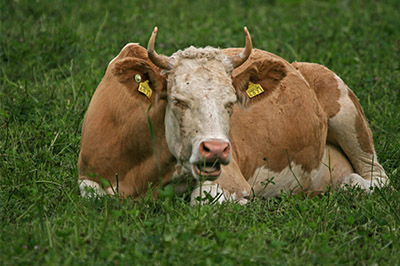 Biolait, the milky way of organic products
Biolait, the milky way of organic products "Organic products for all and everywhere"
Behind the highly committed slogan hides a major player in the French organic milk industry: Biolait. The company follows the concept of solidarity economy and gathers producers from all over France around an ideal: to condense ethics and profits in a milk bottle.
Unity makes strength
"Biolait has the soul of a cooperative in the body of a company" says its CEO Christophe Baron. However, this milk collection organisation is not a company like any other. It has democratic governance, follows the spirit of solidary economy and is eco-friendly, unlike high-intensity farming.
In 1994, 6 producers created Biolait to promote the development of the organic milk market through a common project. Unlike other cooperative players of the milk sector, the group did not limit its scope to a geographic area. Wherever he is, a farmer can join Biolait and benefit from a collection/distribution system with clients.
The group also looked to stabilise prices in order to guarantee milk profitability. From western to central France, Biolait buys milk at the same price, regardless of the logistic costs incurred by the collection. "A producer doing his best to produce organic products should be encouraged, and help between producers contributes to that" say Christophe Baron and his 650 partners from 54 French regions.
Leader of French organic milk
A few months back, Biolait celebrated its 20th anniversary. This is a fine age for the company now leader in organic milk collection in France. Biolait was first created as an Economic Interest Group (a French consortium form), but became a simplified joint-stock company (more or less similar to a Limited Liability Company) in 2006, with an investment cap of 250 Euros per partner.
Today, the group accounts for 27% of French organic milk production. In 2014, 135 million litres were sold to international groups or small business owners throughout Europe. The system proved to be working: in 2009, producers from Biolait were not hit by the crisis that shook the sector.
What is organic milk?
According to the European regulation of 2009, in order to benefit from the "organic" label, a milk-producing cow must be fed with fertilizer-free grass, enjoy a minimum space and graze as much as possible. The use of antibiotics must be limited. In addition to the eco-friendly line, organic milk is different from industrial milk in its taste, texture and limited allergenic risk. The label "100 % agriculture biologique" (100% organic farming) is the only one to guarantee a full product traceability.
Organic milk: approved by consumers
According to the Agence Bio (French agency for the development and promotion of organic farming), in 2014, organic milk consumption boomed by 11%. The trend should continue and internationalise: in China, high classes are changing to adopt this consumption habit. The sector is facing a shortage due to this demand.
The end of European quotas voted by the EU Commission on the 1st of April 2015 won't change anything. It is not profitable for an organic farmer to outsource the feeding of the livestock out of his farm: because of the surface of a farm area, the production capacity is limited by the very nature of the organic market. In order to increase the offer, "Biolait is trying to convince more producers to join us", says Christophe Baron.
A promising sector?
Agence Bio identified a 3.4% increase of conversions from traditional to organic milk farming, thanks to government subsidies. However, the sector is facing the difficult issue of transmission from a generation to the next. This issue concerns all of the agriculture industry but bears an additional risk: the purchaser of an organic livestock may want to go back to conventional agriculture. However, Christophe Baron thinks that this is a limited trend: "This cannot unsettle the market."
To address the issue, a "subsidy to purchase" was recently voted by the group. The aim is to keep a Biolait farm organic. Christophe Baron is optimistic: "organic farms represent 4% of French agricultural surfaces, but they employ 7% of farmers. In the current adverse backdrop, we offer jobs: it is now our role to promote the job and show how exciting it is to be a farmer! "

